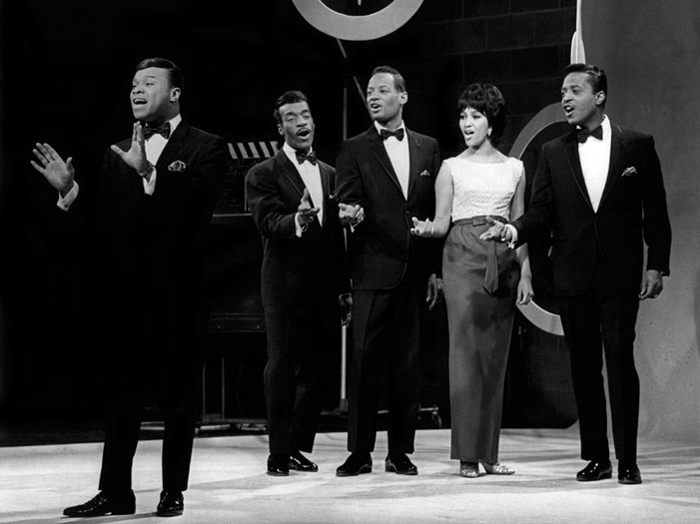In Celebration of the Human Voice - The Essential Musical Instrument
Home | Doo Wop | Barbershop | World | Contemporary | Christian | Vocal Jazz | Choral | Christmas | Instructional | Arrangements
Classical | Opera | Musicals | Personality | Young Singers | Disney | Videos | Songs | The Artists

The Platters History

Click Here for Sheet Music and Songbook Vocal Arrangements
One of the leading R&B vocal groups of the 50s, they were the first black group to be accepted as a major chart act and, for a short time, were the most successful vocal group in the world. The Platters were formed in Los Angeles in 1953 by entrepreneur/songwriter Buck Ram (21 November 1907, Chicago, Illinois, USA, d. 1 January 1991). Through his ownership of the Platters' name, Ram was able to control the group throughout their career, and his talent for composing and arranging enabled the Platters to make a lasting impression upon popular music. Their original line-up, Tony Williams (b. 5 April 1928, Elizabeth, New Jersey, USA, d. 14 August 1992, New York, USA; lead tenor), David Lynch (b. 1929, St. Louis, Missouri, USA, d. 2 January 1981; tenor), Alex Hodge (baritone) and Herb Reed (b. 1931, Kansas City, Missouri, USA; bass), recorded unsuccessfully in 1954, precipitating the arrival of two new members, Paul Robi (b. 1931, New Orleans, Louisiana, USA, d. 2 January 1989), who replaced Hodge, and Zola Taylor (b. 18 March 1934, Los Angeles, California, USA, d. 30 April 2007, Riverside, California, USA; contralto). Signed to Mercury Records, the Platters secured their first hit in 1955 when 'Only You' reached the US Top 5, an effortlessly light performance that set the pattern for subsequent releases, including 'The Great Pretender', 'My Prayer' and 'Twilight Time', each of which reached number 1 in the US charts. 'Smoke Gets In Your Eyes' (previously a hit for Paul Whiteman in 1934), which was an international number 1 hit single in 1958-59, highlighted their smooth delivery and arguably remains the group's best-loved release. Lead singer Williams left for a solo career in 1961, taking with him much of the Platters' distinctive style. His departure led to further changes, with Sandra Dawn and Nate Nelson replacing Taylor and Robi. With Sonny Turner as the featured voice, the group began embracing a more contemporary direction, evidenced in such occasional pop hits as 'I Love You 1000 Times' (1966) and 'With This Ring' (1967). During the late 60s, and for a long time afterwards, personnel changes brought much confusion as to who were the legitimate Platters. Sonny Turner and Herb Reed formed their own version, while Tony Williams did likewise. The Platters' legacy has since been undermined by the myriad of line-ups performing under that name, some of which had no tangible links to the actual group. This should not detract from those seminal recordings that bridged the gap between the harmonies of the Mills Brothers and the Ink Spots and the sweet soul of the ensuing decade. In the late 80s, Buck Ram continued to keep an eagle eye on the Platters' sold-out appearances at Las Vegas and other US cities. They were inducted into the Rock And Roll Hall Of Fame in 1990, but Ram died the following year. |
Select a Category |
Want to Sing? - Find a Chorus Near You
List of Choruses by State | List of Choruses by City
